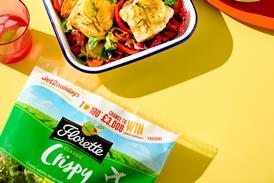Stores in Scotland face a tougher set of legal restrictions than their colleagues south of the border
While the new government of England and Wales begins its first term with encouraging talk of reducing regulation on small firms and seeking evidence-based solutions to social problems, its counterpart north of the border seems to be ending its first stint in power heading in the opposite direction.
The SNP-led Scottish government is tackling Scotland's difficult relationships with alcohol, tobacco and food with a series of measures to restrict supply, rather than demand, and it's the nation's small shops who are bearing the burden of this approach. Led by Justice Minister Kenny MacAskill and Health Minister Shona Robison, the administration has slowly turned the screw on retailers who find themselves faced with restrictions on their trade which, they contend, won't address the underlying problems of historically poor eating and drinking habits, and high smoking levels.
The man charged with putting the retailers' case is John Drummond, chief executive of the Scottish Grocers' Federation (SGF), based just a couple of miles from the Scottish government's home in Holyrood, Edinburgh. John and the SGF's public affairs advisor Katie Mackie enjoy a good relationship with the policy-makers down the road. "The good news is that they are very accessible, and we have no problems getting to talk to them and put our case," says John. "The bad news is that they listen to our argument that regulation that is not evidence-based is bad regulation, and accept our view, but then say they're going to do it anyway because they believe it's the right thing to do."
SGF's 220 members have some 1,100 stores between them and are still reeling from last year's introduction of new rules for licensed premises under the Scottish Licensing Act 2005. This sets a requirement for stores to have both a premises licence and a personal licence holder, as well as limiting alcohol displays and promotions and establishing mandatory age-related sales training for staff. The whole exercise was costly in both time and expense for retailers, and was further complicated by being interpreted differently by local licensing boards, who also found themselves unable to cope with the volume of licence applications.
Now that's settled down it's time for round two. Late last year the government introduced the Alcohol etc (Scotland) Bill, which set out to establish a minimum unit price of 45p as well as a package of other measures aimed at the off-trade, including an end to multi-buy promotions, restrictions on promotional materials and mandatory age-verification schemes. It also suggests that local authorities should have the power to raise a local 'social responsibility levy', essentially a tax on those who distribute alcohol and, perhaps most worryingly, it would allow councils to raise the age of purchase for off-sales to 21 in some areas.
Of these measures, the one that might perhaps favour smaller retailers the minimum unit price has been rejected by MSPs in the last few days. But independents feel some kind of price setting is necessary for the other proposed restriction to make sense, and without it, Drummond says, the larger retailers will find ways to supply below-cost alcohol without breaking the remaining restrictions.
"The 45p figure would have been acceptable as it would create a level playing field for the whole industry, although we consistently made the point that there is no reason to believe minimum pricing would stop abuse," he explains. "We believe that if the ban on multibuy discounts is implemented and the multiples can't offer three for £10, they will simply sell at £3.33 each," Drummond says. "Or they could simply sell cases cheaper, and discontinue individual bottles. They may also stock a range of cans in different pack configurations, which smaller stores would struggle to find room for.
The ban on promotions would be particularly damaging, he said. "Marketing would be restricted to one area of the store, and window bills and promotional leaflets would be banned. We believe leaflets distributed to the local area are essential tools for small businesses that cannot afford newspaper or television advertising." This proposal would prevent stores advertising locally, but not outside their neighbourhood handing a huge advantage to out-of-town supermarkets.
Rejecting the idea of a social responsibility levy, he adds: "We believe greater emphasis must be placed on personal responsibility, but if there is seen to be justification for a levy it should be based on the alcohol turnover of each store."
SGF aims to persuade MSPs that existing legislation is sufficient to police the sale of alcohol. "The laws already exist and we'll be advising them to enforce what they've got," Drummond says. This cocktail of restrictions could be law by the end of the year, and the minority SNP administration is keen to push implementation through before the next parliamentary elections in May 2011. Not much time, then, to fight for a fairer solution. The SGF favours a formula involving duty, VAT and a further percentage of duty which would ensure products were not sold below cost, to be adopted by governments on both sides of the border.
Smoke screen
The story is similar with tobacco, where again it's the point of sale which is under assault. Plans for a ban on the display of cigarettes and tobacco products far exceed those in England, with the proposed maximum display area currently set at 120cm that's about the size of a single packet. On a 1.5m gantry it would mean 200 separate flaps to open. "It would be an operational nightmare, and expensive, too we estimate £1,400 for a single gantry retrofit."
With the influential health lobby convinced that hiding cigarettes from view in shops will stop youngsters smoking them, the ban is seemingly a done deal. However, there's still a victory to be won and in this case it's a dilution of the proposals so they match those in England, where the display area is likely to be 1,500sq cm. SGF is also arguing that the implementation dates October 2011 for small stores and 2013 for smaller ones are unrealistic given that the details are undecided and that there are likely to be legal challenges. It's unlikely retailers would be able to make the necessary amends to fixtures in time. The Federation will also point out the rise in illicit trade seen in Ireland since a similar ban, and repeat the often-made point that there is no compelling evidence from anywhere in the world that such a measure is effective in reducing youth smoking.
"The government is looking at a lot of different strategies and we will ask if they are really based on evidence," Drummond adds. "Also, of course, we are still in a very difficult economic climate, and the government should not be asking retailers to spend a lot of money on measures for which there is no proof they will work."
On the plus side, the Scottish government has agreed with SGF's insistence that it should be an offence for a person under the age of 18 to attempt to purchase tobacco, and for an adult to purchase tobacco of behalf of a child. These are central to retailers' belief that responsibility for sales must be shared, and both are included in the Act.
Another step that won't upset c-stores too much is a register of tobacco retailers which begins in April 2011 and to which all must be signed up by next October.
It costs nothing to register and the measure is designed to crack down on people who sell cigarettes at car boot sales and from ice cream vans rather than legitimate stores.
With a fine of up to £20,000 for unlicensed sellers, it's one measure the legitimate retailers should applaud although a licence to trade is a licence that can be removed if its terms are breached.
The third area of interest to the Scottish government is healthy eating. Its Obesity Road Map includes proposals to restrict children's access to inappropriate meals and energy-dense foods from businesses located near schools. Fortunately, there is no sign of legislation to enforce this yet, and the SGF is heading off that eventuality with its Healthy Living programme, which has been running since 2005.
Designed to encourage retailers to stock fruit, vegetables and milk, Healthy Living provides stands and POS material and stores have seen a good increase in sales. "Locating fruit stands next to the checkout to encourage impulse purchasing is becoming common practice and a number of convenience stores near schools are offering healthy meal deals," Drummond says.
It is having the desired effect: a survey last year found that convenience customers have increased the number of times they eat fruit and vegetables a week, by 15.8% and 23.5% respectively.
The programme receives funding from the government and the backing of manufacturers, and Drummond is confident that this voluntary approach will stave off formal controls.
While the new government of England and Wales begins its first term with encouraging talk of reducing regulation on small firms and seeking evidence-based solutions to social problems, its counterpart north of the border seems to be ending its first stint in power heading in the opposite direction.
The SNP-led Scottish government is tackling Scotland's difficult relationships with alcohol, tobacco and food with a series of measures to restrict supply, rather than demand, and it's the nation's small shops who are bearing the burden of this approach. Led by Justice Minister Kenny MacAskill and Health Minister Shona Robison, the administration has slowly turned the screw on retailers who find themselves faced with restrictions on their trade which, they contend, won't address the underlying problems of historically poor eating and drinking habits, and high smoking levels.
The man charged with putting the retailers' case is John Drummond, chief executive of the Scottish Grocers' Federation (SGF), based just a couple of miles from the Scottish government's home in Holyrood, Edinburgh. John and the SGF's public affairs advisor Katie Mackie enjoy a good relationship with the policy-makers down the road. "The good news is that they are very accessible, and we have no problems getting to talk to them and put our case," says John. "The bad news is that they listen to our argument that regulation that is not evidence-based is bad regulation, and accept our view, but then say they're going to do it anyway because they believe it's the right thing to do."
SGF's 220 members have some 1,100 stores between them and are still reeling from last year's introduction of new rules for licensed premises under the Scottish Licensing Act 2005. This sets a requirement for stores to have both a premises licence and a personal licence holder, as well as limiting alcohol displays and promotions and establishing mandatory age-related sales training for staff. The whole exercise was costly in both time and expense for retailers, and was further complicated by being interpreted differently by local licensing boards, who also found themselves unable to cope with the volume of licence applications.
Now that's settled down it's time for round two. Late last year the government introduced the Alcohol etc (Scotland) Bill, which set out to establish a minimum unit price of 45p as well as a package of other measures aimed at the off-trade, including an end to multi-buy promotions, restrictions on promotional materials and mandatory age-verification schemes. It also suggests that local authorities should have the power to raise a local 'social responsibility levy', essentially a tax on those who distribute alcohol and, perhaps most worryingly, it would allow councils to raise the age of purchase for off-sales to 21 in some areas.
Of these measures, the one that might perhaps favour smaller retailers the minimum unit price has been rejected by MSPs in the last few days. But independents feel some kind of price setting is necessary for the other proposed restriction to make sense, and without it, Drummond says, the larger retailers will find ways to supply below-cost alcohol without breaking the remaining restrictions.
"The 45p figure would have been acceptable as it would create a level playing field for the whole industry, although we consistently made the point that there is no reason to believe minimum pricing would stop abuse," he explains. "We believe that if the ban on multibuy discounts is implemented and the multiples can't offer three for £10, they will simply sell at £3.33 each," Drummond says. "Or they could simply sell cases cheaper, and discontinue individual bottles. They may also stock a range of cans in different pack configurations, which smaller stores would struggle to find room for.
The ban on promotions would be particularly damaging, he said. "Marketing would be restricted to one area of the store, and window bills and promotional leaflets would be banned. We believe leaflets distributed to the local area are essential tools for small businesses that cannot afford newspaper or television advertising." This proposal would prevent stores advertising locally, but not outside their neighbourhood handing a huge advantage to out-of-town supermarkets.
Rejecting the idea of a social responsibility levy, he adds: "We believe greater emphasis must be placed on personal responsibility, but if there is seen to be justification for a levy it should be based on the alcohol turnover of each store."
SGF aims to persuade MSPs that existing legislation is sufficient to police the sale of alcohol. "The laws already exist and we'll be advising them to enforce what they've got," Drummond says. This cocktail of restrictions could be law by the end of the year, and the minority SNP administration is keen to push implementation through before the next parliamentary elections in May 2011. Not much time, then, to fight for a fairer solution. The SGF favours a formula involving duty, VAT and a further percentage of duty which would ensure products were not sold below cost, to be adopted by governments on both sides of the border.
Smoke screen
The story is similar with tobacco, where again it's the point of sale which is under assault. Plans for a ban on the display of cigarettes and tobacco products far exceed those in England, with the proposed maximum display area currently set at 120cm that's about the size of a single packet. On a 1.5m gantry it would mean 200 separate flaps to open. "It would be an operational nightmare, and expensive, too we estimate £1,400 for a single gantry retrofit."
With the influential health lobby convinced that hiding cigarettes from view in shops will stop youngsters smoking them, the ban is seemingly a done deal. However, there's still a victory to be won and in this case it's a dilution of the proposals so they match those in England, where the display area is likely to be 1,500sq cm. SGF is also arguing that the implementation dates October 2011 for small stores and 2013 for smaller ones are unrealistic given that the details are undecided and that there are likely to be legal challenges. It's unlikely retailers would be able to make the necessary amends to fixtures in time. The Federation will also point out the rise in illicit trade seen in Ireland since a similar ban, and repeat the often-made point that there is no compelling evidence from anywhere in the world that such a measure is effective in reducing youth smoking.
"The government is looking at a lot of different strategies and we will ask if they are really based on evidence," Drummond adds. "Also, of course, we are still in a very difficult economic climate, and the government should not be asking retailers to spend a lot of money on measures for which there is no proof they will work."
On the plus side, the Scottish government has agreed with SGF's insistence that it should be an offence for a person under the age of 18 to attempt to purchase tobacco, and for an adult to purchase tobacco of behalf of a child. These are central to retailers' belief that responsibility for sales must be shared, and both are included in the Act.
Another step that won't upset c-stores too much is a register of tobacco retailers which begins in April 2011 and to which all must be signed up by next October.
It costs nothing to register and the measure is designed to crack down on people who sell cigarettes at car boot sales and from ice cream vans rather than legitimate stores.
With a fine of up to £20,000 for unlicensed sellers, it's one measure the legitimate retailers should applaud although a licence to trade is a licence that can be removed if its terms are breached.
The third area of interest to the Scottish government is healthy eating. Its Obesity Road Map includes proposals to restrict children's access to inappropriate meals and energy-dense foods from businesses located near schools. Fortunately, there is no sign of legislation to enforce this yet, and the SGF is heading off that eventuality with its Healthy Living programme, which has been running since 2005.
Designed to encourage retailers to stock fruit, vegetables and milk, Healthy Living provides stands and POS material and stores have seen a good increase in sales. "Locating fruit stands next to the checkout to encourage impulse purchasing is becoming common practice and a number of convenience stores near schools are offering healthy meal deals," Drummond says.
It is having the desired effect: a survey last year found that convenience customers have increased the number of times they eat fruit and vegetables a week, by 15.8% and 23.5% respectively.
The programme receives funding from the government and the backing of manufacturers, and Drummond is confident that this voluntary approach will stave off formal controls.















No comments yet